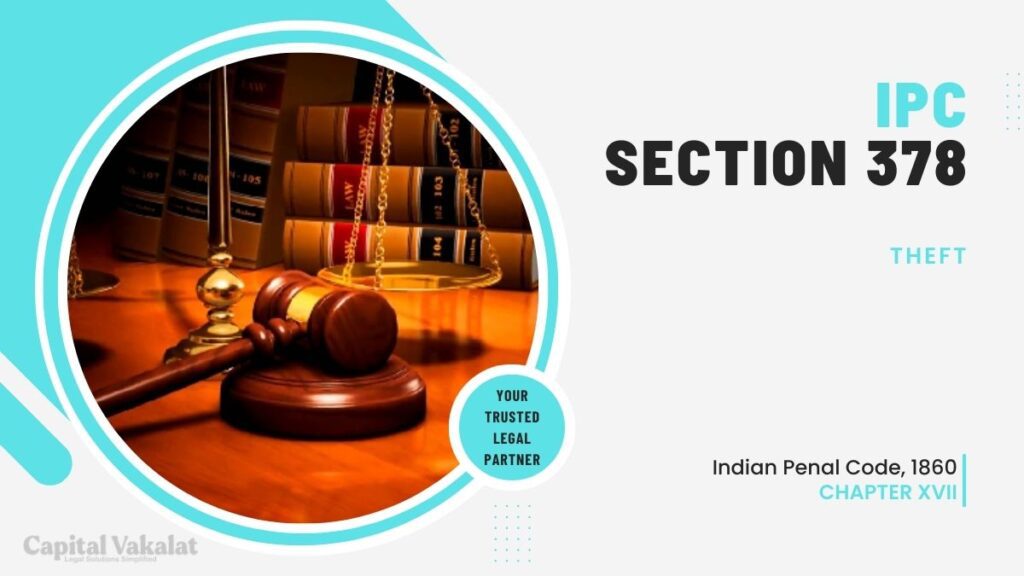The term “Theft” carries a weight of significance within legal frameworks, and Section 378 of the Indian Penal Code (IPC) is a cornerstone in addressing this criminal act. In this article, we will delve into the intricacies of Section 378 IPC, exploring its historical context, essential elements, and the impact it has on society.

Understanding the nuances of theft laws is crucial for both legal practitioners and the general public, as it plays a pivotal role in maintaining order and justice.
Historical Context
The concept of theft has evolved over centuries, adapting to societal changes and legal advancements. Section 378 IPC, embedded in the legal history of India, reflects the collective wisdom of lawmakers in addressing property-related offenses. Exploring the historical context helps us comprehend the roots of theft laws and their significance in shaping the modern legal landscape.
Elements of Section 378 IPC
To understand the implications of Section 378 IPC, it’s essential to break down its elements. This section outlines the specific components that constitute a theft offense and distinguishes it from other criminal acts. By dissecting the legal language, individuals gain a clearer insight into the nature of theft as defined by the IPC.
Classification of Theft Offenses
The severity of theft cases varies, leading to the classification of offenses into categories such as petty theft and grand theft. This section explores the distinctions between these classifications, shedding light on the degrees of punishment associated with different theft scenarios. Understanding the gradations in theft offenses is crucial for legal practitioners and those seeking justice.
Case Studies
Real-life examples provide a practical understanding of how Section 378 IPC is applied in different scenarios. By examining actual cases, we gain insights into the legal outcomes, the role of evidence, and the implications for both offenders and victims. Case studies serve as valuable lessons, illustrating the complexities of theft prosecutions.
Challenges in Prosecuting Theft Cases
Prosecuting theft cases comes with its own set of challenges. Gathering sufficient evidence, establishing intent, and countering legal defenses are critical aspects. This section delves into the difficulties faced by legal authorities in ensuring a fair trial and the measures taken to overcome these challenges.
Role of Technology in Combating Theft
As technology advances, so do the methods of theft. This section explores the intersection of theft and technology, focusing on digital theft and cybercrime. It discusses evolving techniques in investigation and prevention, emphasizing the role of technology in both committing and combatting theft.
Impact of Section 378 IPC on Society
Beyond legal ramifications, theft laws have a profound impact on society. This section delves into the deterrent effect of such laws, their role in prevention, and the potential for restitution and rehabilitation of offenders. Understanding the societal implications helps in evaluating the overall effectiveness of Section 378 IPC.
Recent Amendments and Updates
The legal landscape is dynamic, and Section 378 IPC undergoes amendments and updates. This section explores the changes in the section over time and their implications for offenders and legal practitioners. Staying informed about the latest developments is crucial for anyone navigating the legal intricacies of theft offenses.
Conclusion
In conclusion, Section 378 IPC stands as a crucial pillar in addressing theft offenses. From its historical roots to the challenges faced in modern prosecutions, understanding this section is paramount. The multifaceted impact on society, coupled with the evolution of theft laws, highlights the importance of a nuanced approach to justice.
Frequently Asked Questions
How does technology influence theft cases in the modern era?
Technology plays a significant role in both committing and combating theft, with digital theft and cybercrime presenting new challenges for law enforcement.
What distinguishes petty theft from grand theft under Section 378 IPC?
The classification is based on the value of the stolen property, with petty theft involving smaller amounts and grand theft involving more substantial values.
Can theft cases be challenging to prosecute, and why?
Yes, prosecuting theft cases can be challenging due to difficulties in gathering evidence, establishing intent, and countering legal defenses.
Have there been recent changes to Section 378 IPC?
Section 378 IPC undergoes amendments and updates over time, reflecting changes in legal perspectives and societal needs. Stay informed about the latest developments for accurate understanding.